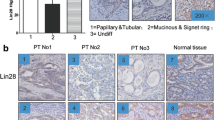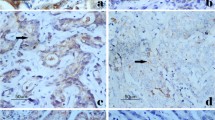Abstract
The purpose of this study was to investigate the expression of Lin28 in gastric carcinoma and to assess its clinical significance. The expression level of Lin28 was assessed by reverse-transcriptase polymerase chain reaction in 10 surgically resected gastric carcinoma and corresponding normal tissues, and by immunohistochemical staining in surgically resected gastric carcinoma tissues of 229 patients, including 215 curative resection patients and 14 palliative resection patients. The expression level of Lin28 mRNA in gastric carcinoma tissues and corresponding normal tissues had no statistically significant difference. In curative resection patients, Lin28 protein expression was positive in 99 of 215 (46.0 %) gastric carcinoma tissues. In palliative resection patients, Lin28 protein expression was positive in 4 of 14 (28.6 %) gastric carcinoma tissues. In R0 patients, Lin28 protein positive expression was correlated with poor outcome (P = 0.017). In multivariate analysis, the Lin28 protein positive expression was a significant independent prognostic factor for overall survival (P = 0.024; HR, 1,768; 95 % CI 1.077–2.903). Our results indicate that Lin28 was expressed in both gastric carcinoma and corresponding normal tissues. Lin28 protein positive expression served as an independent prognostic factor.



Similar content being viewed by others
References
Hohenberger P, Gretschel S. Gastric cancer. Lancet. 2003;362:305–15.
Albain KS, Barlow WE, Shak S, et al. Prognostic and predictive value of the 21-gene recurrence score assay in postmenopausal women with node-positive, oestrogen-receptor-positive breast cancer on chemotherapy: a retrospective analysis of a randomised trial. Lancet Oncol. 2010;11:55–65.
Paik S, Tang G, Shak S, et al. Gene expression and benefit of chemotherapy in women with node-negative, estrogen receptor-positive breast cancer. J Clin Oncol. 2006;24:3726–34.
Xie SD, Xu CY, Shen JG, et al. HER 2/neu protein expression in gastric cancer is associated with poor survival. Mol Med Rep. 2009;2:943–6.
Xu CY, Guo JL, Jiang ZN, Wang LB, et al. Prognostic role of estrogen receptor alpha and estrogen receptor beta in gastric cancer. Ann Surg Oncol. 2010;17:2503–9.
Lehrbach NJ, Armisen J, Lightfoot HL, et al. LIN-28 and the poly(U) polymerase PUP-2 regulate let-7 microRNA processing in Caenorhabditis elegans. Nat Struct Mol Biol. 2009;16:1016–20.
West JA, Viswanathan SR, Yabuuchi A, et al. A role for Lin28 in primordial germ-cell development and germ-cell malignancy. Nature. 2009;460:909–13.
Wong SS, Ritner C, Ramachandran S, et al. miR-125b promotes early germ layer specification through Lin28/let-7d and preferential differentiation of mesoderm in human embryonic stem cells. PLoS ONE. 2012;7:e36121.
Gonzalez F, Barragan Monasterio M, Tiscornia G, et al. Generation of mouse-induced pluripotent stem cells by transient expression of a single nonviral polycistronic vector. Proc Natl Acad Sci USA. 2009;106:8918–22.
Piskounova E, Viswanathan SR, Janas M, et al. Determinants of microRNA processing inhibition by the developmentally regulated RNA-binding protein Lin28. J Biol Chem. 2008;283:21310–4.
Viswanathan SR, Daley GQ, Gregory RI. Selective blockade of microRNA processing by Lin28. Science. 2008;320:97–100.
Heo I, Joo C, Kim YK, et al. TUT4 in concert with Lin28 suppresses microRNA biogenesis through pre-microRNA uridylation. Cell. 2009;138:696–708.
Polesskaya A, Cuvellier S, Naguibneva I, et al. Lin-28 binds IGF-2 mRNA and participates in skeletal myogenesis by increasing translation efficiency. Genes Dev. 2007;21:1125–38.
Qiu C, Ma Y, Wang J, et al. Lin28-mediated post-transcriptional regulation of Oct4 expression in human embryonic stem cells. Nucleic Acids Res. 2010;38:1240–8.
Lv K, Liu L, Wang L, et al. Lin28 mediates paclitaxel resistance by modulating p21, Rb and Let-7a miRNA in breast cancer cells. PLoS ONE. 2012;7:e40008.
Oh JS, Kim JJ, Byun JY, et al. Lin28-let7 modulates radiosensitivity of human cancer cells with activation of K-Ras. Int J Radiat Oncol Biol Phys. 2010;76:5–8.
Peng S, Maihle NJ, Huang Y. Pluripotency factors Lin28 and Oct4 identify a sub-population of stem cell-like cells in ovarian cancer. Oncogene. 2010;29:2153–9.
Viswanathan SR, Powers JT, Einhorn W, et al. Lin28 promotes transformation and is associated with advanced human malignancies. Nat Genet. 2009;41:843–8.
Saiki Y, Ishimaru S, Mimori K, et al. Comprehensive analysis of the clinical significance of inducing pluripotent stemness-related gene expression in colorectal cancer cells. Ann Surg Oncol. 2009;16:2638–44.
Xu B, Zhang K, Huang Y. Lin28 modulates cell growth and associates with a subset of cell cycle regulator mRNAs in mouse embryonic stem cells. RNA. 2009;15:357–61.
Yu J, Vodyanik MA, Smuga-Otto K, et al. Induced pluripotent stem cell lines derived from human somatic cells. Science. 2007;318:1917–20.
Zhang J, Wilson GF, Soerens AG, et al. Functional cardiomyocytes derived from human induced pluripotent stem cells. Circ Res. 2009;104:30–41.
Hamano R, Miyata H, Yamasaki M, et al. High expression of Lin28 is associated with tumour aggressiveness and poor prognosis of patients in oesophagus cancer. Br J Cancer. 2012;106:1415–23.
Takamizawa J, Konishi H, Yanagisawa K, et al. Reduced expression of the let-7 microRNAs in human lung cancers in association with shortened postoperative survival. Cancer Res. 2004;64:3753–6.
Landi MT, Zhao Y, Rotunno M, et al. MicroRNA expression differentiates histology and predicts survival of lung cancer. Clin Cancer Res. 2010;16:430–41.
Acknowledgments
The study was supported by Zhejiang Science Foundation of China Y208218 (Zhinong jiang).
Conflict of interest
We declare that we have no conflict of interest.
Author information
Authors and Affiliations
Corresponding authors
Rights and permissions
About this article
Cite this article
Xu, C., Shen, J., Xie, S. et al. Positive expression of Lin28 is correlated with poor survival in gastric carcinoma. Med Oncol 30, 382 (2013). https://doi.org/10.1007/s12032-012-0382-x
Received:
Accepted:
Published:
DOI: https://doi.org/10.1007/s12032-012-0382-x




